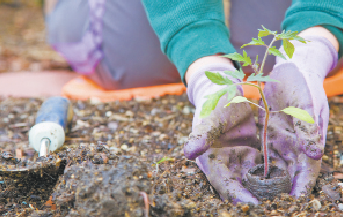How to Fertilize Gardens Properly in the Hamptons

At this time of year, we think of fertilizing the garden. There are many fertilizers available but in my years of gardening I have ceased using most of them.
Though studies have been done for many years on the effects of antibiotics used in the production of animals, fish and seafood, this information is just beginning to seep into mainstream awareness. We are learning that these drugs are showing up in our meat, vegetables, milk and water. They are major contributors to the antibiotic-resistant super bacteria infecting humans, which are becoming dangerously ubiquitous. Because the antibiotics can lose their effectiveness in the animals over time, higher and higher doses of antibiotics are used.
About 30% to 80% of these drugs are excreted in manure and many of them seep into the ground water from runoff and manure pits. When manure is spread onto farm soil, so are the antibiotics. Although all of the effects on soil have not been fully studied, it’s known that some break down and some do not. In the soil, they disrupt the essential biological activity that’s necessary to feed plants. Plants, especially root crops, absorb them and we then eat them.
Some studies say that high temperature composting breaks down some of them—but how does one know if that composted manure fertilizer has been made at high temperatures? I assume that antibiotics are in dried manure and that any fertilizer containing blood or bone meal, chicken byproducts or feathers contains antibiotics. Even fish emulsion contains preservatives, heavy metals and toxins.
There are plant-based fertilizer materials (more than one kind may be needed depending on what each supplies) such as alfalfa, cottonseed, corn and flax meals but these are made from plants grown from GMO seeds.
The above is a very limited report of the many aspects of antibiotics in meat production and GMO seeds. I have spent many hours studying these, will spend many more and still not know the
full ramifications.
For these reasons, I use no fertilizers containing any animal or fish products, though many of them are allowed for organic growing. (Know that many dogs will eat soil upon which anything containing blood meal has been used.)
For eight years, I was an estate gardener and had complete control of everything that went into the large compost pile. If you have a garden, flower or vegetable, you can do this. The compost can be used as-is and a tea can be made of it and applied. If you know a farmer who uses no feed with antibiotics, you can use the manure produced. Compost it first. You may be able to raise chickens, control their food and use their manure. You can make a vermiculture situation (worms). This produces a very valuable fertilizer source.
Chemical fertilizers are not an option for me. They kill the flora and fauna in the soil, which are the true feeders of plants, necessitating their constant use to provide nutrients.
The best fertilizer is the soil. Feed it and it will feed the plants. Compost is a great option, especially homemade. Read the contents on bags. None I have found is perfect, but because I can’t make enough for all of my clients, I use bagged compost. I use worm castings. They are as close to a perfect fertilizer as anything I know. They don’t burn plants. They contain humus, microorganisms and minerals appropriate to plants. They can be mixed into potting and planting soil and/or applied to the surface of soil. They are available locally.
I also use non-wood based mulch when I can (some clients have a favorite mulch). Earth worms, nature’s perfect soil companions, like to live in cool, damp, dark places, like under leaves or straw. Just disturb that accumulation of winter’s leaves and see the happy worms.
So, at this time of year, I apply 1–2 inches of compost and a good sprinkling of worm castings. This process is more expensive than using the readily available fertilizers, but nutritious food is more expensive than fast food.
Jeanelle Myers is a professional gardener, landscaper and consultant.
For gardening discussion you can call her at
631-434-5067.



